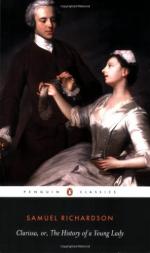Hast thou a mind tot see what it was I permitted Miss Howe to write to her lovely friend? Why then, read it here, so extracted from her’s of Wednesday last, with a few additions of my own. The additions underscored.*
* Editor’s note: In place of italics, as in the original, I have substituted hooks [ ].
MY DEAREST FRIEND,
You will perhaps think that I have been too long silent. But I had begun two letters at different times since my last, and written a great deal each time; and with spirit enough I assure you; incensed as I was against the abominable wretch you are with; particularly on reading your’s of the 21st of the past month.
The first I intended to keep open till I could give you some account of my proceedings with Mrs. Townsend. It was some days before I saw her: and this intervenient space giving me time to reperuse what I had written, I thought it proper to lay that aside, and to write in a style a little less fervent; for you would have blamed me, I knew, for the freedom of some of my expressions, (execrations, if you please.) And when I had gone a good way in the second, and change your prospects, on his communicating to you Miss Montague’s letter, and his better behaviour, occasioning a change in your mind, I laid that aside also. And in this uncertainty thought I would wait to see the issue of affairs between you before I wrote again; believing that all would soon be decided one way or other.
***
[Here I was forced to break off. I am too little my own mistress:—My mother* is always up and down—and watching as if I were writing to a fellow. What need I (she asks me,) lock myself in,** if I am only reading past correspondencies? For that is my pretence, when she comes poking in with her face sharpened to an edge, as I may say, by a curiosity that gives her more pain than pleasure.—The Lord forgive me; but I believe I shall huff her next time she comes in.]
* See Letter XX. of this volume. ** Ibid.
***
Do you forgive me too, my dear—my mother ought; because she says I am my father’s girl; and because I am sure I am her’s.
[Upon my life, my dear, I am sometimes of opinion, that this vile man was capable of meaning you dishonour. When I look back upon his past conduct, I cannot help, and verily believe, that he has laid aside such thoughts. My reasons for both opinions I will give you.]
[For the first: to-wit, that he had it once in his head to take you at advantage if he could, I consider* that] pride, revenge, and a delight to tread in unbeaten paths, are principal ingredients in the character of this finished libertine. He hates all your family, yourself excepted— yet is a savage in love. His pride, and the credit which a few plausible qualities, sprinkled among his odious ones, have given him, have secured him too good a reception from our eye-judging, our undistinguishing, our self—flattering, our too-confiding sex, to make assiduity and obsequiousness, and a conquest of his unruly passions, any part of his study.




